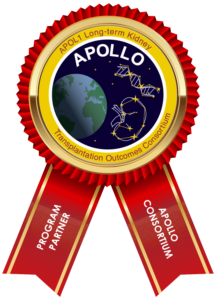UNCKC Registry Participation
Please click on the links below to learn more about each registry.
APOL1 Long-term Kidney Transplantation Outcomes Consortium (APOLLO)
Cure Glomerulonephropathy (CureGN) Network
Kidney Precision Medicine Project (KPMP)
Nephrotic Syndrome Study Network (NEPTUNE)
Transformative Research in Diabetic Nephropathy (TRIDENT)
APOL1 Long-term Kidney Transplantation Outcomes Consortium (APOLLO)
Funding Source: National Institute of Allergy & Infectious Disease (NIAID), National Institute of Diabetes and Digestive and Kidney Diseases (NIDDK), National Institute of Minority Health & Health Disparities
 APOLLO is a national observational study. The purpose of this study is to test kidney donors and kidney transplant recipients for variants (or forms) of the apolipoprotein L1 gene (called APOL1) to determine whether they impact outcomes. APOLLO will follow individuals who receive a kidney from an eligible (living or deceased) kidney donor. In addition, APOLLO will follow individuals who donate a kidney to assess the impact of the APOL1 gene. This study is being done to improve outcomes after kidney donation and kidney transplantation.
APOLLO is a national observational study. The purpose of this study is to test kidney donors and kidney transplant recipients for variants (or forms) of the apolipoprotein L1 gene (called APOL1) to determine whether they impact outcomes. APOLLO will follow individuals who receive a kidney from an eligible (living or deceased) kidney donor. In addition, APOLLO will follow individuals who donate a kidney to assess the impact of the APOL1 gene. This study is being done to improve outcomes after kidney donation and kidney transplantation.
Webinar hosted by the American Association of Kidney Patients:
Introduction to APOLLO Video
AAKP APOL-1 Video Presentation
To read more about the study please visit https://theapollonetwork.org/ or contact Paula Steele at paula_steele@med.unc.edu.
Cure Glomerulonephropathy (CureGN) Network 
Funding Source: National Institute of Diabetes and Digestive and Kidney Diseases (NIDDK)
Cure Glomerulonephropathy (CureGN) is a multicenter, longitudinal cohort study of glomerular disease patients funded by the National Institute of Diabetes and Digestive and Kidney Diseases (NIDDK) at the National Institutes for Health (NIH).
The CureGN project follows 2,400 children and adults with the following glomerular diseases: minimal change disease (MCD), focal segmental glomerulosclerosis (FSGS), membranous nephropathy (MN), and IgA nephropathy (IGAN).
Participants are followed longitudinally to better understand the causes of disease, response to therapy, and disease progression, with the ultimate objective to cure glomerulonephropathy. The UNC Kidney Center is one of four Participating Clinical Centers (PCC).
The UNC PCC is led by Primary Investigator Ron Falk, MD, Site Principal Investigator Amy Mottl, MD and Lead Study Coordinator Caroline Poulton, MSW. Maggie D’Angelo, RN, is the primary study coordinator for the UNC site. As one of the PCCs, UNC oversees seven additional sub sites: Hôpital Maisonneuve-Rosemont/University of Montreal, Medical University of South Carolina, Northwestern University, Ohio State University, University of Alabama at Birmingham, Vanderbilt University, and Virginia Commonwealth University.
Study participants are followed longitudinally, with collection of clinical data and biological specimens, to better understand the causes of disease, response to therapy, and disease progression. The goal of this registry is to provide an infrastructure to allow research that will ultimately cure glomerulonephropathy and answer the questions commonly asked by patients that we are still unable to adequately answer:
“What is this disease?”
“Why do I have this disease?”
“What will happen to me?”
“What effective treatments can you offer me?”
This study is a first of its kind, due to the size and collaborative nature of the project, and it is hoped that this registry will continue to collect data for decades and be the ultimate resource for research on patients with these diseases.
To read more about the study please visit https://curegn-org.webflow.io/ or contact Caroline Poulton at caroline_poulton@unc.edu.
Kidney Precision Medicine Project (KPMP)
Funding Source: National Institute of Diabetes and Digestive and Kidney Diseases (NIDDK)
 The KPMP is a multi-year collaboration of leading research institutions to study patients with kidney disease. In collaboration with a number of research centers across the United States, we aim to accomplish the goals of the KPMP by obtaining kidney tissue from KPMP participants, analyzing it using state-of-the-art technologies, and developing next-generation software tools to visualize and share the resulting data. We need to better understand the mechanisms of acute kidney injury (AKI) and chronic kidney disease (CKD). Access to human kidney biopsy tissue is a critical first step to define disease heterogeneity and determine the precise molecular pathways that will facilitate identification of specific drug targets and ultimately enable individualized care for people with AKI and CKD.
The KPMP is a multi-year collaboration of leading research institutions to study patients with kidney disease. In collaboration with a number of research centers across the United States, we aim to accomplish the goals of the KPMP by obtaining kidney tissue from KPMP participants, analyzing it using state-of-the-art technologies, and developing next-generation software tools to visualize and share the resulting data. We need to better understand the mechanisms of acute kidney injury (AKI) and chronic kidney disease (CKD). Access to human kidney biopsy tissue is a critical first step to define disease heterogeneity and determine the precise molecular pathways that will facilitate identification of specific drug targets and ultimately enable individualized care for people with AKI and CKD.
To read more about the study please visit https://www.kpmp.org/ or contact KPMPrc-unc@uw.edu
Nephrotic Syndrome Study Network (known as NEPTUNE) 
Funding Source: National Institutes of Health, Office of Rare Diseases, NephCure Kidney International, University of Michigan
The Nephrotic Syndrome Study Network (known as NEPTUNE) brings together physician scientists at 22 research consortia in the United States and Canada, along with the patient advocacy groups, NephCure Kidney International and the Halpin Foundation, to advance research on the diseases that define nephrotic syndrome (NS). Already, NEPTUNE has collected longitudinal, biological material and detailed clinical data from more than 450 NS research participants, and has supported pilot and ancillary studies utilizing the NEPTUNE data resources.
The research questions are:
-
- What are the underlying causes of FSGS, MCD and MN?
- What are the most effective treatments for each disease?
- What is the most useful way to classify these diseases in order to encourage scientific discovery and to inform the selection the most effective treatments?
- How does the disease and treatment affect the way a patient feels?
- How common or uncommon are complications of nephrotic syndrome?
- Can new blood and urine tests be developed to help predict how well a patient will respond to treatment?
NEPTUNE continues to recruit more research participants as well as to continue to support training and research programs for scientists and clinicians. You can find information on the NEPTUNE Ancillary Studies Program and grant and fellowship programs on this website.
The UNC clinical center is led by Vimal Derebail, MD and Keisha Gibson, MD.
To learn more please visit https://www.rarediseasesnetwork.org/cms/neptune or contact Sara Kelley at sara_kelley@med.unc.edu.
Transformative Research In Diabetic Nephropathy (TRIDENT)
Funding Source: GlaxoSmithKline,Regeneron, Boehringer-Ingelheim, and Gilead Biosciences
Transformative Research In DiabEtic NephropaThy, or TRIDENT, aims to develop ground-breaking therapeutics for patients living with diabetic kidney disease (or diabetic nephropathy) via the use of next generation multi-omics and precision medicine approaches.
Diabetic kidney disease (or diabetic nephropathy) is a complication of diabetes that affects kidney function. Close to 30-50% of people living with diabetes will develop diabetic kidney disease, and there are approximately five million people with diabetic kidney disease just in the United States. Despite improvement in medical care for patients with diabetes, those with diabetic-related kidney disease remain at increased risk of death.
Diabetes causes damage to the kidneys’ filtration system at the glomerular level. This damage causes leakiness of the kidney filter allowing leakage of protein into the urine. Prolonged leakiness of the kidney filter results in tissue scarring, progression of kidney damage, and functional decline.
TRIDENT is a collaborative network of expert physicians, basic scientists, clinical researchers, and renal pathologists from 16 North American medical centers and three pharmaceutical companies devoted to improving the lives of those affected by diabetic kidney disease.
TRIDENT will recruit 300 patients with diabetes and kidney disease to collect biological samples to perform comprehensive molecular analysis for disease classification and development of therapeutic targets.
This is a prospective observational cohort study of patients with a medical diagnosis of diabetes that will undergo clinically indicated kidney biopsies. The biopsy, along with blood and urine samples from our patients will enable the TRIDENT team to use high-throughput genomic analysis and associated genetic and biomarker testing to characterize those diabetic patients at highest risk for developing end-stage kidney failure versus those with more stable diabetic kidney disease. Our hope is to ultimately improve the lives of all patients with diabetic kidney disease and prevent diabetes-related kidney failure. Each participating clinical site will enroll participants for the TRIDENT study.
The principal investigator for the UNC TRIDENT site is Amy Mottl, MD.
For more information, please visit https://www.med.upenn.edu/trident/ or contact Sara Kelley, UNC study coordinator, at sara_kelley@med.unc.edu.
